Macron’s Amazon fire backlash
After posting an old photo of the Amazon fires, Macron triggered a sudden Twitter backlash
Macron’s Amazon fire backlash
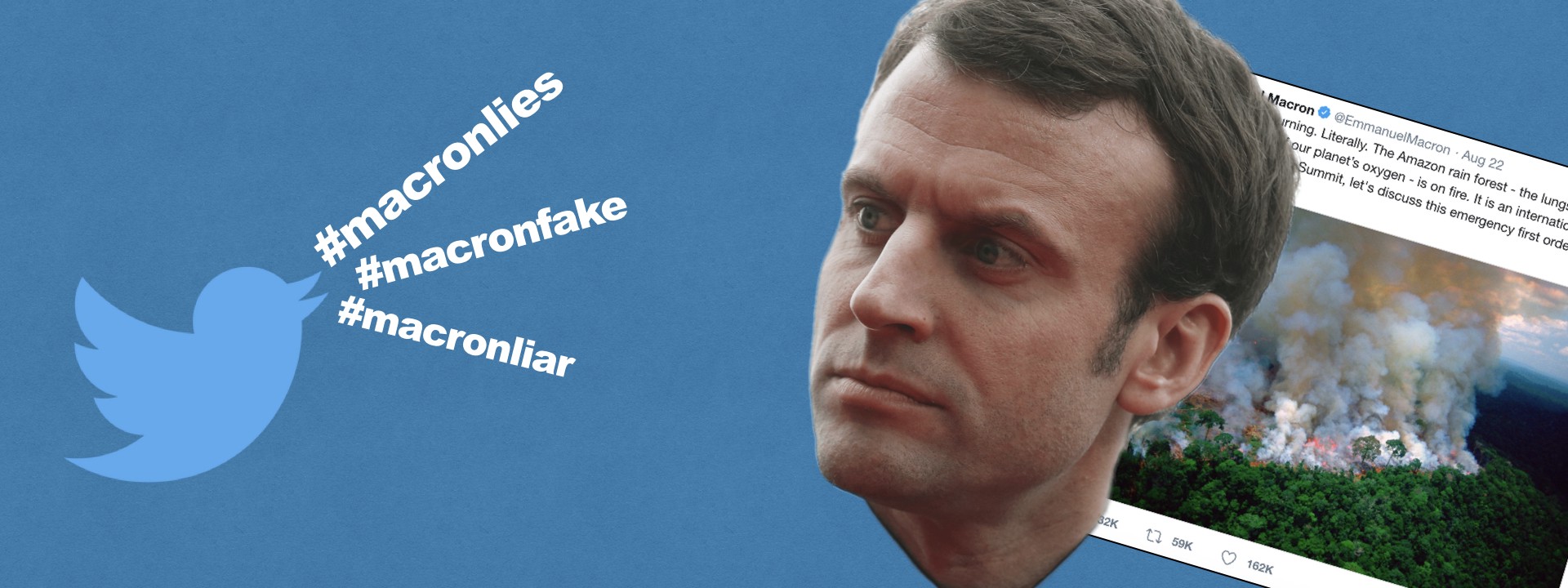
BANNER: (Source: @LAndriukaitis/DFRLab via StickPNG/archive)
In response to the recent uproar around Brazil’s sluggish action on an elevated number of fires in the country’s stretch of the Amazon, French President Emmanuel Macron undermined his own argument by using an old photograph and inaccurate information about the Amazon forest fires in a tweet calling for action. The tweet drew a ferocious response, predominantly from Brazilians who expressed their dissatisfaction on Twitter.
The fires in the Amazon rainforest have yielded a muddy information environment online, of which Macron’s tweet was one of the more widely covered. The resulting online conversation, whether intentional or not, served to draw attention to political parlor games and one-upmanship instead of the issue at hand. The backlash to Macron’s tweet, for example, diverted attention away from the fires ravaging the Amazon toward Macron himself.
The DFRLab identified several signs that this response might have been the result of a coordinated attempt by Bolsonaro supporters.
This was one of the first, but not the sole, instance in which old photos of burning forests were circulated as if they were current images of the Amazon. Reports have surfaced of various celebrities trying to raise awareness about the Amazon fires using old photos of previous fires, some of which occurred in other countries.
Of all of these blunders, Macron’s tweet seemed to have received the most negative attention from Twitter users as the large portion of the comments under the post were negative. In addition to the criticism it triggered, Macron’s tweet also sparked a personal feud with Brazil’s President Jair Bolsonaro, who accused Macron of having a “colonialist mindset in the 21st century” in suggesting the Amazon should be internationalized, perceived by Brazil as an act of imperialistic intervention. The feud escalated further, leading Bolsonaro to announce that he would refuse assistance from the G7 countries to fight the forest fires, though he would later retract that pledge.
Macron’s tweet
Our house is burning. Literally. The Amazon rain forest – the lungs which produces 20% of our planet’s oxygen – is on fire. It is an international crisis. Members of the G7 Summit, let's discuss this emergency first order in two days! #ActForTheAmazon pic.twitter.com/dogOJj9big
— Emmanuel Macron (@EmmanuelMacron) August 22, 2019
The DFRLab used TinEye reverse image search engine to check when the image was originally uploaded. TinEye found three different stock image websites featuring the image, with the earliest upload from August 2013.
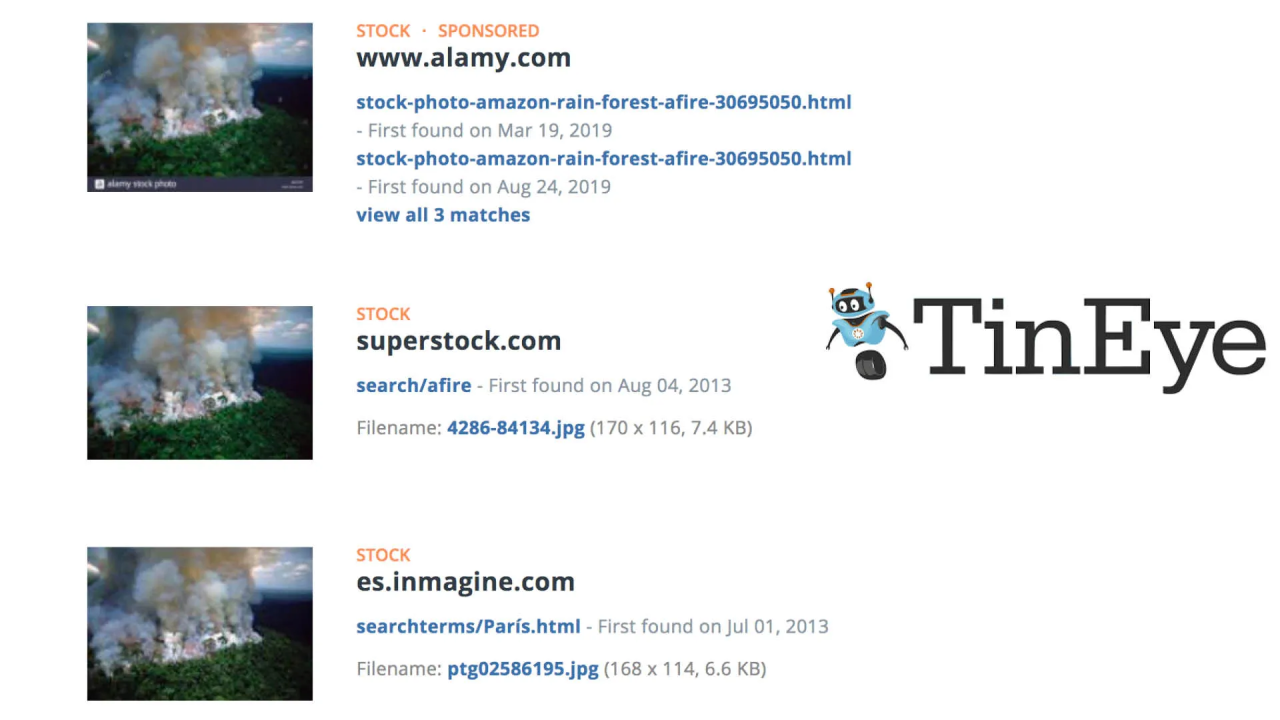
The exact time at which the image was taken is not clear, but the credited photographer, National Geographic photojournalist Loren McIntyre, died in 2003, making the image at least 16 years old.
Additionally, in his tweet, Macron claimed that Amazon is responsible for 20 percent of the world’s oxygen and referred to it as the “lungs” of the planet. Yet, according to various sources, the Amazon is responsible for only around 6 percent of oxygen in terms of current production, and its output accounts for only a small fraction of the total volume of oxygen in the atmosphere, a majority of which has accumulated over tens of millions of years. This statement was therefore somewhat misleading.
In response to Macron’s tweet, Brazilian President Bolsonaro tweeted an accusation that the French president was weaponizing the situation for political gain and chasing after sensation by posting false images.
On other occasions, the Brazilian leader has said Macron has a vested interest in protecting French international commerce. The French government said it would not sign a trade deal with Mercosur countries if Bolsonaro did not act to stop fires in the Amazon. The deal was signed on June 28, 2019, after 20 years of negotiation in which it faced strong resistance from the French agriculture sector. The trade deal still has to be ratified by country’s governments.
In the first of two tweets, Bolsonaro said (in Portuguese):
“I’m sorry that President Macron tries to weaponize an internal question of Brazil and from other Amazon countries for political gains. The sensationalist tone with which he refers to the Amazon (even using false pictures) does not contribute to the solution of the problem.”
The second tweet read:
“The Brazilian government remains open to dialogue, based on objective data and mutual respect. The French President’s suggestion that the Amazon be discussed at the G7 without participation of countries in the region evokes a colonialist mentality that does not fit in the 21st century.”
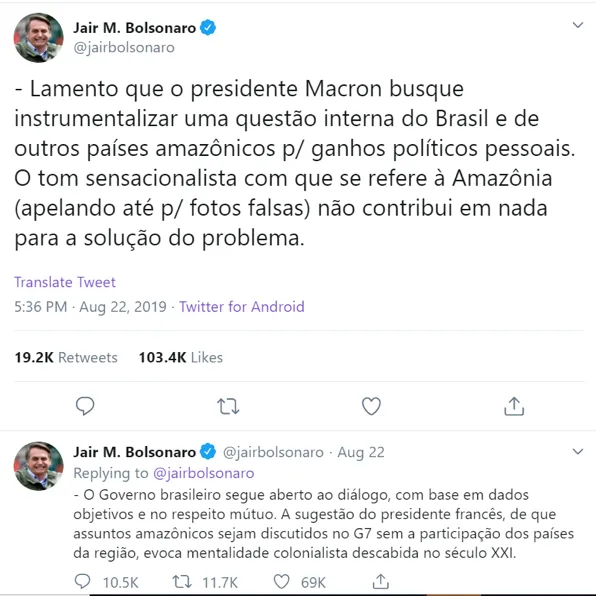
Two days later, somewhat hypocritically, Bolsonaro similarly used an old picture to say that the Air Force was fighting the blazes in the rainforest. According to the Minister of Defense, who originally posted the image, it had “illustrative purposes.” The image was published in 2015 and was taken in Bahia, in the northeast region of Brazil.
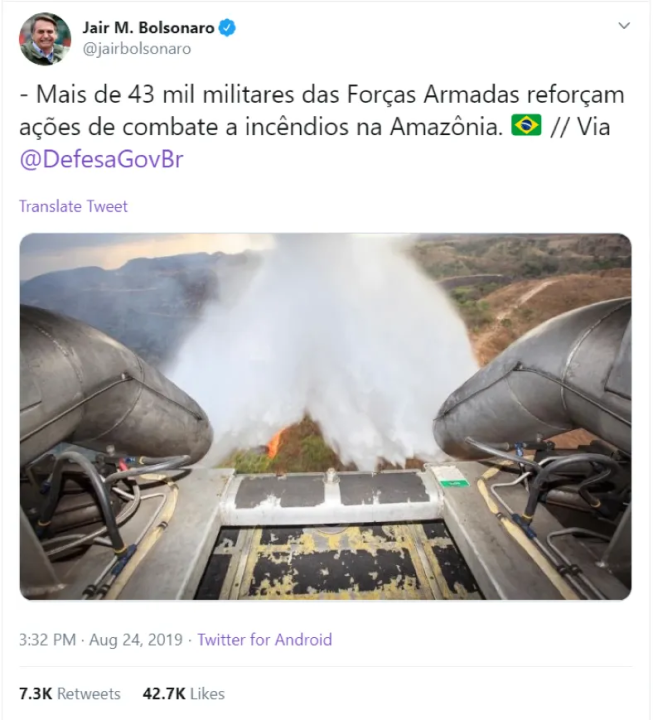
Anti-Macron hashtags trend
The DFRLab used the social media listening tool Sysomos to determine the extent of the backlash in response to Macron’s tweet.
Searching several relevant keywords (“Macron,” “fake news,” and “Amazon”) in the one-week period between August 20 and August 27, 2019, yielded relatively few responses. Hashtags, however, yielded significantly more responses. Five of the top 10 trending hashtags about the Amazon during the week directly referred to Macron in a negative light: #macronlies, #macronfake, #macronliar, #macronfakenews, and #macronlegrandmenteur (“macronthebigliar,” in French).

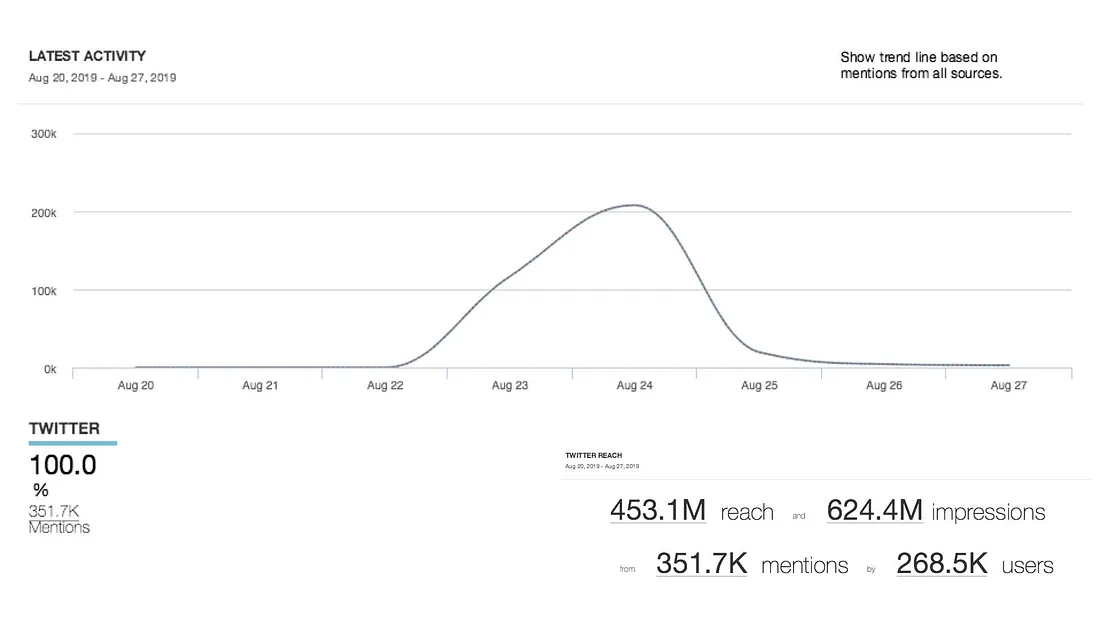
The DFRLab analyzed the type of tweets containing the #MacronLies hashtag and found that 54 percent of the hashtag’s mentions were retweets. On average, each user posted the hashtag four times. Furthermore, the top 1 percent of accounts in terms of activity level generated 23 percent of the traffic. These findings suggested that the hashtag’s popularity may have been driven by a small group of users may attempting to amplify the hashtag.

Additionally, the Sysomos Authority Scores for the accounts mentioning the hashtag indicated that a significant portion (62.7 percent) of them had an Authority Score between 5 and 8. Sysomos assigns each Twitter account an Authority ranking between 0 and 10, with 10 signifying very high reach and influence. Low Authority Score accounts have a higher probability of being a bot. It is important to note that Authority Scores alone are imperfect measures of probability of whether an account is a bot and, therefore, should be taken as a low-confidence indicator rather than a definitive assessment.
The DFRLab investigated a sample of low Authority Score subset, finding that a large portion was bot-like accounts. A similar examination of a subset of medium scoring accounts detected no significant bot-like activity.
Two of the accounts that Sysomos suggested to be the most influential have an alphanumeric handle, a suspicious profile image, and a very high posting rate compared to the number of followers. These indicators often point toward inauthenticity, whether in behavior, profile design, or both.
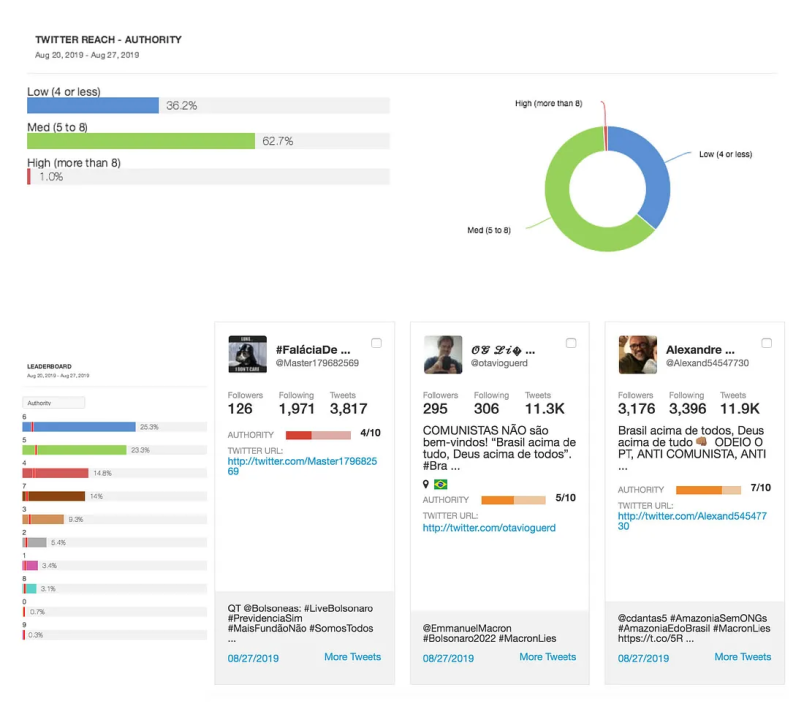
The majority of the “Most Retweeted” Tweets were in Portuguese (74.2 percent) and Spanish (9.3 percent), with English being the third-most popular language (9.2 percent). Sysomos geographical data suggested that over 90 percent of all tweets using the hashtag originated in Brazil, with the majority in Sao Paulo and Rio de Janeiro, with the second highest, only 3.1 percent, originating in the United States.
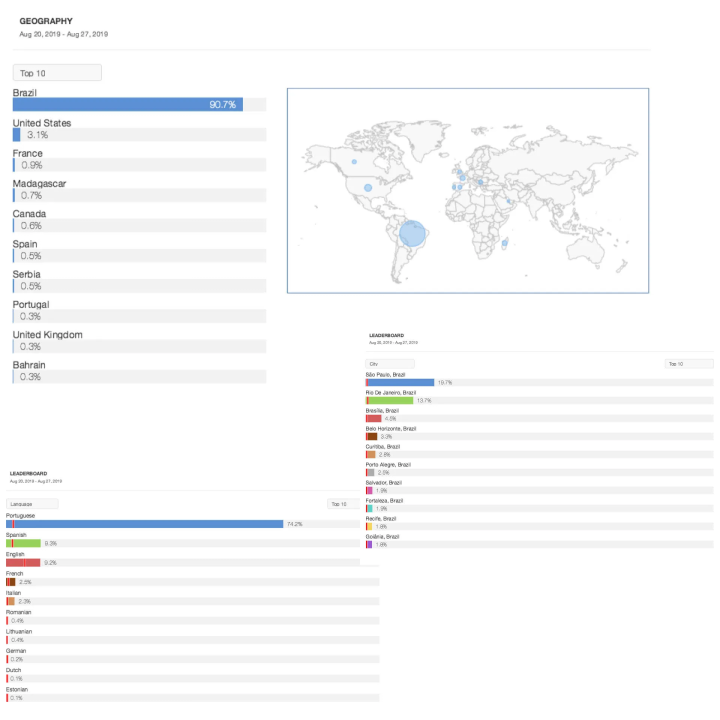
The role of influencers: Carla Zambelli
Several of the most retweeted posts came from the account of Carla Zambelli, a Brazilian congresswoman from Bolsonaro’s political party. She urged Twitter users to make the #MacronLies hashtag trend.
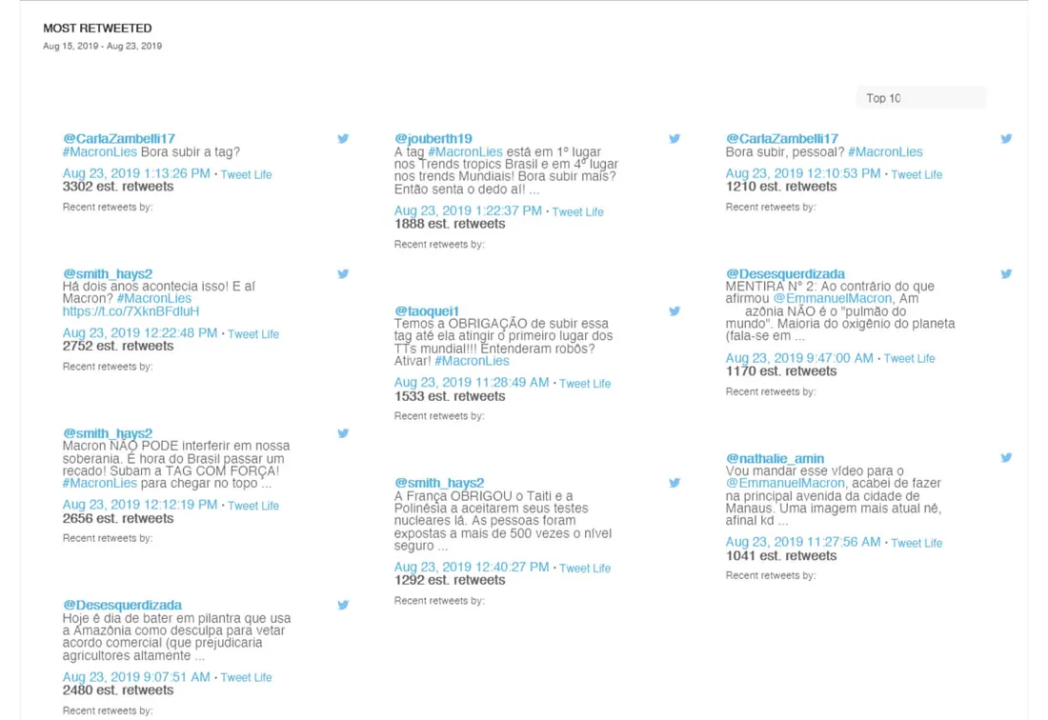
Lastly, according to Sysomos the fourth tweet of the #MacronLies hashtag came from an pro-Bolsonaro influencer account: @Desesquerdizada. Like @CarlaZambelli17, this account also urged Twitter users to make the hashtag trend.
Hoje é dia de bater em pilantra que usa a Amazônia como desculpa para vetar acordo comercial (que prejudicaria agricultores altamente subsidiados pelo governo).
Obviamente estamos falando do presidente da França, @EmmanuelMacron.
Hoje é dia de hashtag internacional: #MacronLies— Caneta Desesquerdizadora (@Desesquerdizada) August 23, 2019
Conclusion
The backlash against Macron following his tweet seemed coordinated by a small group of active Twitter users.
After several influencer accounts instructed their followers to help trend anti-Macron hashtags, a relatively concentrated group of Brazilian users, many of them Bolsonaro supporters, started using the hashtag #MacronLies. While there may have been some bot activity involved, most of these accounts were likely not automated. The likely purpose of this campaign was to shift focus away from Macron’s criticism of Bolsonaro for his handling of the Amazon fires, or from the fires more generally, toward criticism of Macron himself.
Follow along for more in-depth analysis from our #DigitalSherlocks.

